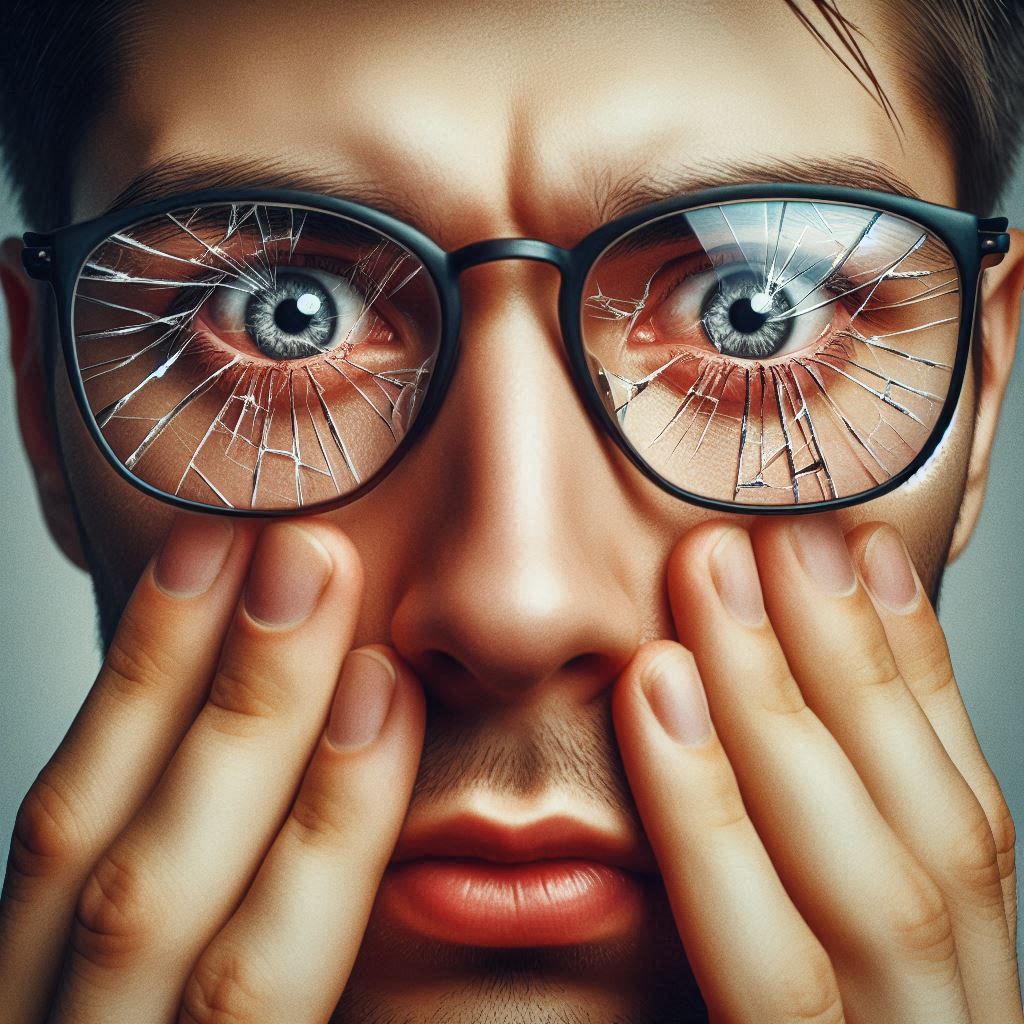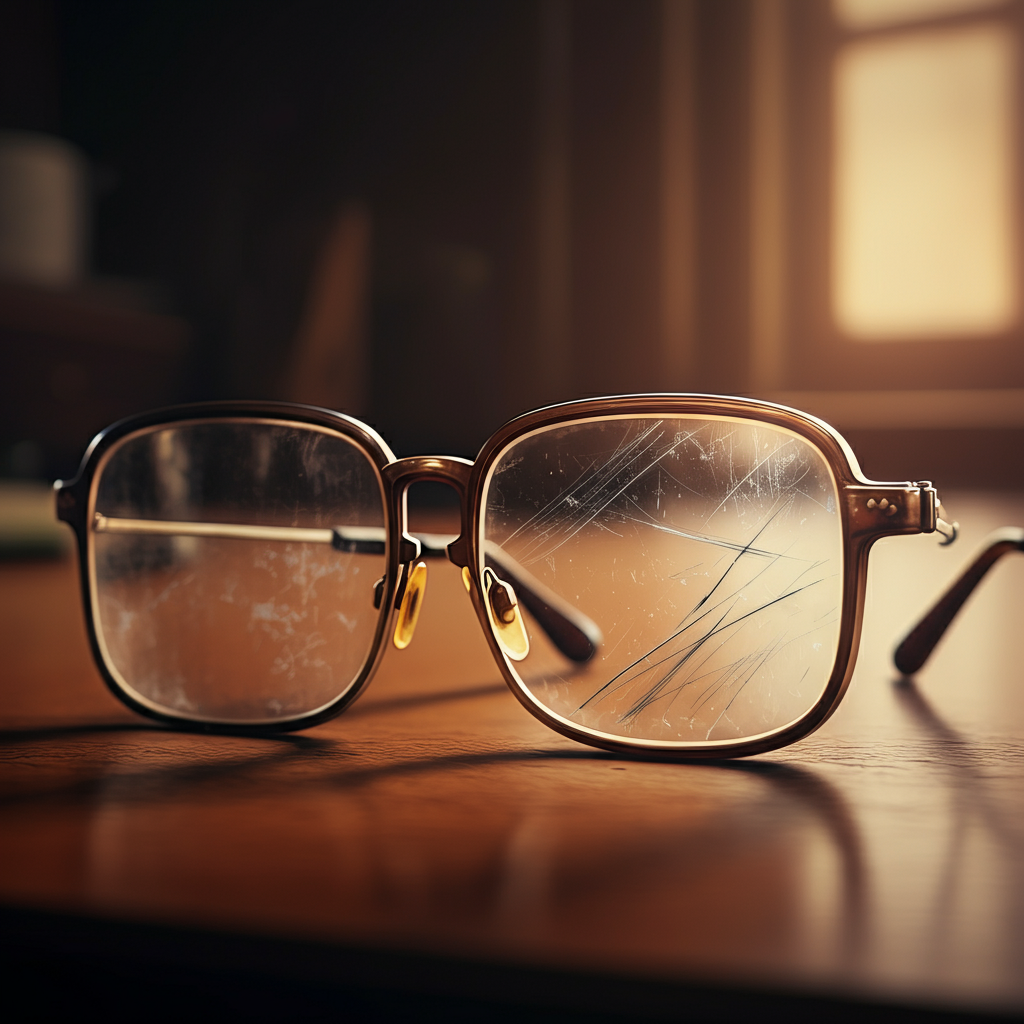Your glasses are much more than functional accessories—they’re your window to the world, offering clarity and precision for every moment. However, scratches on the lenses can feel like looking through a frosted pane, distorting your view and compromising your visual experience. With thoughtful care and elegant solutions, you can prevent scratches and restore the polished beauty of your lenses. This guide will show you how to care for your glasses with sophistication and ensure your vision remains crisp and luxurious.

The Impact of Scratches on Your Vision
Imagine sipping coffee from a perfectly clear glass, only to find a faint crack twisting the view—that’s the effect of scratches on your lenses. Even the smallest imperfections can scatter light, creating distortions, blurring your vision, and straining your eyes. Over time, these issues may lead to discomfort, headaches, and an overall sense of distraction.
But fear not. With the right techniques and habits, you can avoid these disruptions and keep your glasses as pristine as the day you got them.
How to Prevent Scratches on Your Glasses
Prevention starts with care. Introducing refined habits into your routine can make all the difference. Here are some practices to elevate the longevity of your lenses:
1. Always Place Glasses in a Protective Case
Indulge in a beautiful, hard-shell case lined with a soft interior. A well-crafted case is a thoughtful investment that shields your glasses from accidental damage when they’re not in use.
2. Clean Your Glasses Mindfully
Cleaning your lenses should feel like a gentle ritual, not a chore. Follow these steps for a scratch-free experience:
- Rinse lenses with warm water to remove any residual dust or particles.
- Use a microfiber cloth paired with a lens-safe cleaning solution for delicate wiping.
- Avoid harsh towels or tissues that can leave minor abrasions.
3. Handle with Care
When removing or adjusting your glasses, always hold the frame by the arms. Avoid touching the lenses, which may lead to smudges and eventual scratches.
4. Opt for Scratch-Resistant Lenses
During your next eyewear upgrade, spoil yourself with lenses featuring scratch-resistant coatings. This luxurious option ensures added durability while maintaining a sleek, polished appearance.
5. Store Thoughtfully
Never leave your glasses face-down on a hard surface. Instead, rest them inside their case or on a soft cloth to reduce exposure to accidental wear.
How to Fix Scratched Glasses
Even with the utmost care, life happens. A minor scratch shouldn’t mean saying goodbye to your favorite glasses; instead, consider these methods to restore them to their original elegance:
1. DIY Treatments for Minor Scratches
Use these gentle remedies for surface-level imperfections:
- Baking Soda Paste
Mix one tablespoon of baking soda with a few drops of water to form a soft paste. Using a microfiber cloth, rub the paste in circular motions over the scratch. Rinse with cool water and dry thoroughly.
- Toothpaste
Non-abrasive (gel-free) toothpaste offers a refined DIY fix. Apply a pea-sized amount to the lens, then gently buff with a soft cotton cloth. Rinse and pat dry.
Note: These techniques can minimize scratches but may not eliminate deeper imperfections.
2. Professional Repairs for Deeper Scratches
For more substantial scratches, trust the expertise of professionals. Many optical centers provide lens repair or replacement services to restore clarity without compromising the coating or quality of your lenses.
3. Consider a Lens Replacement
If damage is extensive, replacing just the lenses—while preserving your cherished frames—offers an elegant solution. Upgrade to high-quality, scratch-resistant options for added durability.
Why Routine Eye Exams Are Essential
Beyond caring for your lenses, maintaining your vision starts with routine eye exams. Optometrists can ensure your prescription is up to date and offer you the latest advancements in lens technology, such as UV protection or glare-reduction coatings. Think of it as pampering your eyes with the attention they deserve.
Elevate Everyday Vision
Scratches don’t have to be distractions in your daily life. With mindful habits and proper care, you can transform your glasses into lasting pieces of functional beauty. And if your lenses are showing signs of age, it might be time for an upgrade.
Your next step? Explore our luxurious collection of high-performance, scratch-resistant lenses, lovingly designed for clarity and sophistication. Begin your journey to flawless vision today. Shop Now.
Your eyes deserve the best—and the world is richer when seen without compromise.
FAQ: Old Glasses and Vision Issues
1. Can Old Glasses Cause Blurry Vision?
Yes, old glasses can cause blurry vision. Over time, the lenses may become scratched or worn down, leading to distortions that affect how light passes through. Scratches, micro-abrasions, or coating degradation can scatter light, causing blurry vision or even doubling of images. Additionally, if your prescription has changed and you continue to use outdated glasses, this can also lead to blurriness because the lenses are no longer optimized for your current vision needs.
2. What Happens If You Keep Wearing Old Glasses?
Continuing to wear old glasses can lead to several visual and physical issues. Firstly, if the lenses are scratched or damaged, they may cause visual distortions, which could strain your eyes. Over time, this can lead to headaches, eye strain, and increased fatigue. Furthermore, if the prescription is outdated, your vision may deteriorate further because your eyes are constantly trying to compensate for the incorrect correction. For individuals with conditions like myopia or hyperopia, outdated glasses could also increase the risk of worsening refractive errors. Ultimately, wearing old glasses consistently can compromise your overall eye health.
3. Why Did My Vision Get Worse After Wearing Glasses?
If you notice your vision seems to have gotten worse after wearing glasses, there are a few potential reasons:
- Incorrect Prescription: If your glasses prescription is outdated or not suited to your current vision needs, your eyes may struggle to focus properly, leading to blurred vision.
- Lens Damage: Scratches or coating wear on the lenses can distort light and create visual disturbances, making your vision seem blurry or less clear.
- Eye Strain: Prolonged use of worn-out or ill-fitting glasses can force your eyes to work harder, causing strain and discomfort. This can sometimes feel like your vision is worsening, even though the glasses may not be the main cause.
- Adjustment Period: If you have recently switched to a new prescription or type of glasses (e.g., progressive lenses or bifocals), your eyes might need time to adjust.
If you experience significant changes in your vision, it’s best to consult an eye care professional to determine the cause and make the necessary adjustments.
4. How Do You Know If Your Glasses Are Too Old?
There are a few key signs to watch for that indicate your glasses may be too old and need replacing:
- Visible Scratches: If your glasses have noticeable scratches or smudges that don’t come off easily, this could affect your vision. Scratches can distort light and cause blurriness or glare, making your lenses harder to see through.
- Outdated Prescription: If your vision has changed over time and you haven’t had your prescription updated recently, your glasses may no longer provide the correct focus. Regular eye exams are important to ensure your prescription is up-to-date.
- Lens Coating Wear: If the anti-reflective, UV, or scratch-resistant coatings on your lenses are peeling or fading, the lenses may no longer perform at their best. These coatings protect your eyes from glare and UV damage, so when they degrade, it can affect your vision and eye health.
- Discomfort or Eye Strain: If your glasses are causing you to experience frequent eye strain, headaches, or discomfort, this is a strong indicator that the glasses are no longer suitable for your vision needs. It’s essential to check if the frames are damaged or the prescription has changed.
In general, if your glasses are showing signs of physical damage, discomfort, or are no longer providing clear vision, it’s time to consider replacing them.

